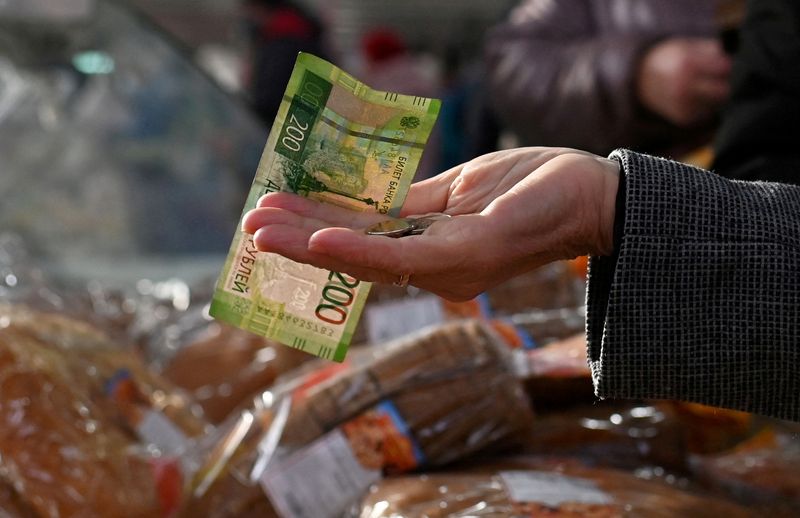(Reuters) -The Russian rouble rose to a more than two-year high against the euro on Friday, supported by capital controls as Russia appeared to make a last-gasp effort to avoid a default and the central bank slashed interest rates by 300 basis points to 14%.
The finance ministry made what appeared to be a late u-turn to avoid a default, as it made a number of already-overdue international debt payments in dollars despite previously vowing they would only be paid in roubles.
The Bank of Russia earlier cut its key interest rate by 300 basis points for the second time this month, surprising analysts who had forecast a smaller reduction, as it tries to manage a shrinking economy and soaring inflation.
Movements on Russian markets are affected by the rouble being propped up by capital controls, while stocks are trading with a ban on short selling and with foreign players barred from ditching shares in Russian companies without permission.
Deputy Central Bank Governor Alexei Zabotkin said Russia would gradually phase out capital controls as risks to financial stability subside.
By 1525 GMT, the rouble was up 1.2% at 74.47 against the euro, after earlier touching 73.50, its strongest level since March 2020.
It was 1.9% firmer against the dollar at 70.74, after earlier hitting a six-month high of 70.3075. On the interbank market, the rouble touched a high of 67.7750.
Lower rates support the economy through cheaper lending but can also fan inflation and make the rouble more vulnerable to external shocks.
Yields on 10-year benchmark OFZ treasury bonds eased to 10.10%.
TAX PAYMENT SUPPORT
The rouble has firmed in the past few days as export-focused companies were selling their foreign exchange revenues to meet local liabilities that could exceed 3 trillion roubles ($43 billion) this month, according to analysts surveyed by Reuters.
Sberbank CIB analysts said exporters could cut back on their FX sales significantly ahead of Russia's long May holidays, a move that could halt the rouble's recent upward trend.
The rouble has fully recovered to levels seen before Feb. 24, when Russia started what it calls "a special military operation" in Ukraine that led to unprecedented Western sanctions, including a freeze on Russia's reserves and efforts to limit Russian banks' access to the global financial system.
Russian stock indexes were higher.
The dollar-denominated RTS index was up 4.3% at 1,087.1 points. The rouble-based MOEX Russian index was 2.5% higher at 2,443.0 points.
Shares in VTB Bank outperformed the wider market, climbing 4.3% after the Kommersant daily reported, citing sources, that the country's second-largest lender may merge with state-controlled banks Otkritie and RNCB.

Promsvyazbank analysts said the move would likely improve VTB Group's performance and the company's share price, as well as allow the banks to optimise their branch network.
($1 = 69.3488 roubles)